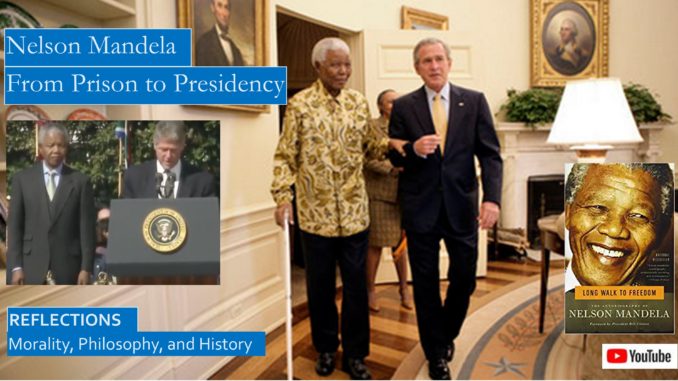
Prison made Mandela a living martyr. Mandela had the good fortune to be the first military director of the ANC just as it started its campaign of sabotage, which meant he was that rarest of generals, the general who had no blood on his hands. His blood free hands allowed him to successfully make the transition to majority rule after apartheid was abandoned.
Blog 1 of this series: http://www.seekingvirtueandwisdom.com/nelson-mandela-blog-1-a-childhood-in-transition/
Blog 2 of this series: http://www.seekingvirtueandwisdom.com/mandela-as-a-reluctant-revolutionary-blog-2/
Please see our YouTube video, with many photos, at: https://youtu.be/X3UnZYeE_kA
Mandela was a stoic. He echoes Epictetus when he writes, “prison and the authorities conspire to rob each man of his dignity. No man or institution can rob me of my dignity because I refuse to part with it for any price or pressure. I never seriously considered the possibility that I would not emerge from prison one day.”
Bill Clinton tells us in the foreword, “I once asked Mandela to describe his long walk from prison to the president. ‘When you are young and strong,’ he told me, ‘you can stay alive on hatred. And I did, more many years.’ Then one day after years of imprisonment, physical and emotional abuse, and separation from his family, Mandela said, ‘I realized that they could take everything from me except my mind and my heart. They could never take these from me. I still had control over my mind and my heart. And I decided never to give them away.’ ”
Much blood was shed after his imprisonment, he was spared the hell of war, he did not have to deal with the atrocities and terrorist acts on both sides, he was spared the difficult decisions those still in the struggle had to make. His autobiography does not have to mention the ugly practice of necklacing, where those Africans suspected of collaboration were collared with auto tires set fire with gasoline. Winnie Mandela got blood on her hands in some of this thuggery, blood which would lead to their divorce after Mandela was released from prison. Her story is poignant, Mandela’s telling of her many visits to him in prison are heart breaking, along with the imprisonment and police harassment she faced herself during his many years in prison.
Mandela’s autobiography does not tell us the story of the bloody struggle that waged for decades, which did poison relations between white and black, which could have ended in misery similar to the misery being experienced in neighboring Zimbabwe today. Rather, Mandela’s autobiography tells us the story of how he survived his prison experience with his dignity and compassion for others intact, how he was able to reconcile white and black in a majority government for whom he would be the first President soon after his release from prison.
Mandela spent nearly thirty years of his life in a series of South African prisons. During this time Mandela was the most famous prisoner in the world, soon after he was incarcerated the UN General Assembly imposed the first trade sanctions against South Africa. The ANC called for his release from prison, as did the Russian government, members of Congress and Parliament, and Adlai Stevenson, who was the American UN delegate. The entire ANC leadership was imprisoned, so its foreign arm assumed the leadership out of necessity. Acts of resistance and sabotage continued. The PAC, a new more radical organization was formed, sometimes cooperating with the ANC, sometimes going their own way.
The government in its raids on ANC offices discovered documents clearly linking Mandela to acts of sabotage. Mandela and the ANC clearly expected that he would become a martyr through a death sentence, but the court instead sentenced him to life imprisonment.
Many readers will choose to judge Mandela solely on whether they think he was a communist. Mandela quotes his speech at his trial addressing these charges, these are excerpts:
“The ideological creed of the ANC is the creed of African National. We do not seek to ‘drive the white man into the sea.’ We seek freedom and the fulfillment for the African people in their own land. . . The ANC has never advocated a revolutionary change in the economic structure of the country, nor has it ever condemned capitalistic society.”
“It is true that there has often been close cooperation between the ANC and the Communist Party. But cooperation is merely proof of a common goal and is not proof of a community of interests.”
“It is difficult for white South Africans to understand why experienced African politicians would so readily accept Communists as their friends. But to us the reason is obvious. Theoretical differences amongst those fighting against oppression is a luxury we cannot afford at this stage. For many decades Communists were the only political group in South Africa who treated Africans as human beings and their equals, who were prepared to eat with us, talk with us, live and work with us. Because of this, there are many Africans who tend to equate freedom with communism.”
Mandela spent nearly two decades as a prisoner working in the lime quarries of Robben Island, a remote prison off the South African coast. The harsh conditions he faced in his early days there eventually we improved over the years. There was a succession of more brutal and more reasonable wardens. Eventually the manual labor lessened and was abolished. Visitors were few, visits were usually limited to thirty minutes, in the early years they were forbidden to receive newspapers. Since he was a famous prisoner the government avoided overly harsh treatment, reporters, the Red Cross, and other international observers visited and interviewed Mandela on occasion. Sometimes the prisoners were allowed to take correspondence courses through the university.
Following the Soweto mass protest in 1976 more radical protesters from the Black Consciousness Movement started filling the prisons, including Robben Island. Mandela remembers, “these young men were a different breed of prisoner than we had ever seen before. They were brave, hostile, and aggressive, they would not take orders, and shouted ‘Amandla!’ at every opportunity. Their instinct was to confront rather than cooperate. The authorities did not know how to handle them.”
Frustrated, the wardens asked Mandela to talk some sense into them. He demurred, instead he encouraged and befriended them, trying to see life through their eyes, which is how Mandela treated everyone. Mandela managed to win many of these new prisoners, and many of them joined the ANC.[1]
Blog 4 of this series: http://www.seekingvirtueandwisdom.com/mandela-talking-with-the-enemy-and-freedom-blog-4/
[1] Nelson Mandela, “Long Walk To Freedom, an Autobiography,” (New York: Little Brown and Company, 1994), pp. 311-510.


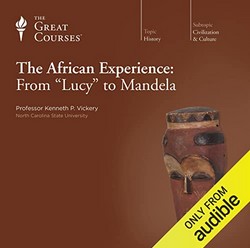
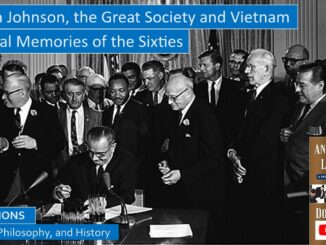
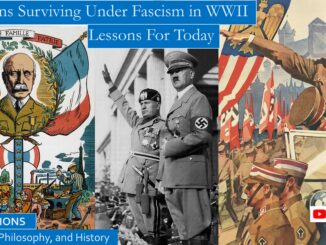
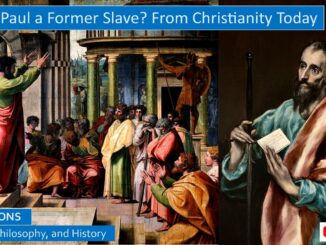
3 Trackbacks / Pingbacks